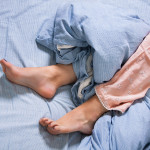By Bonnie Jenkins, Advanced Natural Wellness
All you want is a good night’s sleep. But if you suffer from restless leg syndrome (RLS), sleep can become just a dream. Many people with RLS say that, when they sit or lay down, it can feel like there are bugs crawling around inside their muscles. Others complain of pain, tingling, tightness, itching, aching and burning sensations in their legs. Sometimes the feeling defies description. The only way they can find relief is by moving their legs—and this can go on all night long.
RLS is an incurable neurological disorder that affects about 10 percent of Americans. While doctors don’t know exactly what causes it, some cases may be hereditary. It has also been linked to pregnancy, diabetes, smoking, an iron deficiency and anemia. And, until recently, many doctors didn’t even acknowledge RLS.
All that changed when the pharmaceutical giant GlaxoSmithKline started to market the Parkinson’s drug Requip for RLS. Suddenly RLS became a “real” condition—something sufferers have known for years. But, even though Requip offers some relief by mimicking the brain chemical dopamine, it comes with a laundry list of side effects including abdominal pain, amnesia, anxiety, chest pain, confusion, diarrhea, difficulty breathing, increase/decrease in blood pressure, leg swelling, paralysis, vision problems, and even urinary tract infections. It can also significantly boost your risk of melanoma. Other drugs like codeine and sleeping pills offer temporary relief, but they can also trigger problems like nausea, sleep apnea and dependency.
Fortunately, there are several natural ways to calm the leg sensations that are keeping you up at night:
Iron: An iron deficiency and low blood levels of the iron-storing protein ferritin have been linked to RLS. This means that the lower your iron levels, the more severe the symptoms of restless leg. Bringing your iron levels back to normal by supplementing with iron picolinate can restore ferritin levels and reduce spasms. But—and this is important—too much iron can be just as harmful as too little. To be on the safe side, ask your doctor to check your iron levels. If you are low, he or she will recommend a dosage that is appropriate for you.
Folic Acid: Your brain needs this B vitamin to manufacture the neurotransmitter dopamine. Low dopamine levels increase involuntary spasms. Research published in Alternative Medicine Review showed that supplementing with folic acid improves all RLS symptoms, especially if you’ve inherited the condition or have a problem with dopamine metabolism. Studies use up to 1,000 mcg. of folic acid to balance dopamine levels, but taking this much folic acid can interfere with the laboratory diagnosis of a vitamin B12 deficiency. This could allow the deficiency to progress undetected to the point of irreversible nerve damage. To avoid this, make sure to tell your doctor if you are taking a mega dose of folic acid.
The World's Quickest Solution for Ending Prostate and Urinary Misery
This has recently been revealed to be one of the only real breakthroughs in prostate health.
The seeds of a strange fruit (sometimes called "Chinese Apples") hold powerful phytonutrients that are a revolution in prostate health.
In fact, UCLA and Veterans Administration research have now proved this to be true.
Not only that, but it may be the worlds quickest solution for ending prostate misery.
Simply stated, these phytonutrients represent a huge step beyond beta sitosterol, saw palmetto, and other phytosterols alone.
Simply click HERE if you want to have fast prostate relief...restful, uninterrupted sleep...no more constant "urges to go"...enhanced virility...and optimal prostate support for life.
Magnesium: Many leg cramps are the result of a magnesium deficiency. Making sure you have enough magnesium circulating in your body helps the nerve endings in the muscles work correctly. This means they are able to relax during a cramping spasm. According to a small German trial of mild to moderate RLS, patients taking a magnesium supplement every evening experienced fewer arousals due to leg sensations throughout the night.
Kava: This herb is renowned for its calming properties, which may ease the effects of RLS in much the same way that pharmaceutical sedatives do—but without the side effects. Kava-lactones, the active compounds in kava, are thought to have anti-anxiety, mild analgesic, muscle-relaxing and anticonvulsant effects. All of this can help tame RLS symptoms. Try taking 300 mg. of a standardized kava supplement one hour before going to bed.
If you find yourself moving all night long to relieve the symptoms of RLS, these all natural strategies may offer safe and effective relief. You might even find that a good night’s sleep is once again within your grasp.
References:
Hornyak M. Magnesium therapy for periodic leg movements-related insomnia and restless legs syndrome: an open pilot study. Sleep. 1998;21:501-505.
Patrick LR. Restless legs syndrome: pathophysiology and the role of iron and folate. Alternative Medicine Review. 2007;12:101-112.
Wang J. Efficacy of oral iron in patients with restless legs syndrome and a low-normal ferritin: A randomized, double-blind, placebo-controlled study. Sleep Medicine. 2009;10:973-975






